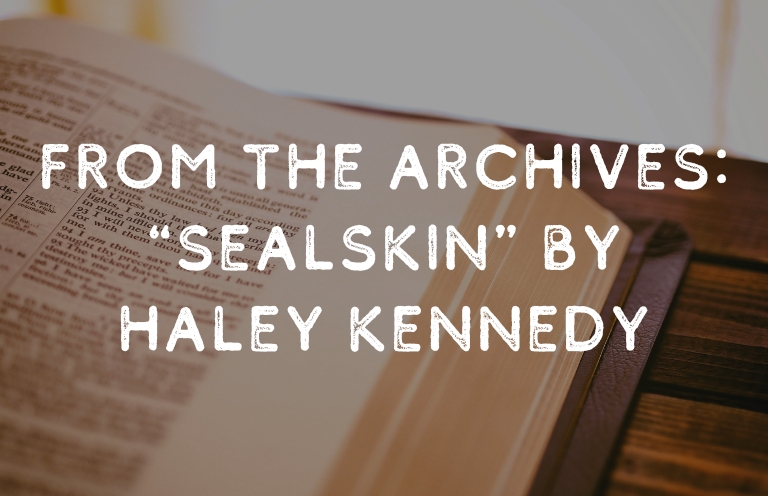What makes a story work? In this space, we dive into the craft of stories from our archive and examine the parts that make them whole. This week, Valerie Hughes digs into “Sealskin” by Haley Kennedy.

Haley Kennedy’s “Sealskin” explores colonialism, memory, and language through the narrator’s recounting moments of connection and disconnection with her mother, a speaker of the extinct Scandinavian language Norn. Against a backdrop of the ocean, the narrator’s mother gives her words in her native tongue throughout the narrator’s childhood. Breadcrumbed throughout the story are Norn words and phrases, which mirror the fragments of sea glass that mother and daughter find on the beach near their home. The chosen Norn words reflect the story’s themes and characters’ relationships. The word faren, which means gone, obsolete, ties in with the themes of extinct languages and colonialism. When the narrator meets her mother’s mysterious aunts, she lists the word brå, which translates to resemblance, likeness. As we delve further into Kennedy’s story, we will explore the way she crafts a story that lingers with the reader, similarly to the way sea salt lingers on the skin after a dip in the ocean.
The extinction of language and colonialism
Norn is a Scandinavian language spoken in Shetland, Orkney, and parts of Scotland before the nineteenth century. The speaker’s mother keeps her extinct language alive and the narrator sees her mother’s native tongue as a connective bridge between them. She often finds herself hoping that her mother will “give me new words.” It is no coincidence that the narrator’s father is “a proud Scot hellbent on reclaiming his heritage.” His presence in the household directly mirrors the Scots’ historical elimination of the Norn language. He gets rid of a gift given to the narrator by her mother’s sisters because he says the present is “unclean.” He sees his wife’s culture as a dirty thing to keep away from their child. In an overheard argument between her parents, the narrator hears her father say that he won’t let her be like her mother.
Because of this tension between her parents, the narrator only receives pieces of her mother’s language when her father isn’t around. When she first meets her aunts, she describes their eyes as “alien” and as they converse in Norn, the narrator “tries to understand” but can only glean a few words’ meanings. Because of the way her father’s presence interrupts her connection to her lineage, the narrator feels disconnected from her relatives. The father’s presence in the story correlates to the way colonialism erases a native people’s cultural practices.
The mystery of memory
Time glides over the reader like water. It washes over you and then it’s gone, like the receding tide. We are given few details of the timeline of the narrator’s memories. She tells us in the opening line that she remembers her mother “in fragments,” similar to shards of sea glass and the broken bits of Norn. We’re told that the narrator is seven years old when her aunts visit but other than that, memories are given to us in the same way they’re recalled: with pieces of imagery and dialogue.
The most grounding elements of the narrator’s memory are the twenty Norn words and phrases sprinkled throughout “Sealskin.” This elusiveness of memory mirrors the narrator’s loose understanding of her mother. She, like her father, struggles to connect to her mother at times. Maybe this is a reflection of the narrator’s shared blood between her Norn mother and Scottish father. She can’t fully be like her mother or father and instead is in an in-between state of being. The narrator doesn’t understand why her mother does the things she does, like admiring the seals despite wearing coats similar to their fur, or why her mother stops mentioning her sisters and mother. She rifles through her memory in search of understanding, as we all do.
Language as a bridge
To the narrator, her mother is a mystery at times. When her mother admires seals after telling her daughter that she used to have a coat with a similar pattern to their skins, the narrator is surprised that her mother can look at seals with such fondness. Sometimes, the mother sleepwalks and one morning, she is found on the beach. After this incident, the narrator is concerned enough to wake up before her mother to ensure that she doesn’t leave the house in the dawn light. The narrator’s strongest connection to her mother is the Norn words she learns from her, which is why she holds them so close. She lists words as a way to keep her tethered to her mother and all of the things she didn’t understand about her as a child.
As an adult, mother and daughter go to a charity shop to donate a coat with a “sleek gray hide” that the father gifted the mother. The mother dismisses the gift as a fraud because it is nothing like the real seal skins that she admires. It is worth noting here that seal skins are worn by multiple indigenous groups throughout the world. It’s possible that the mother was alluding to this practice when she told her daughter that she used to have a coat like seal skin. In the charity shop, the daughter finds a “silky fur coat, silver with speckles.” It has a “sulfurous” scent, like that of low tide. The narrator purchases it for her mother. Outside of the store, her mother is crying. The narrator doesn’t understand why, which reflects her inability to translate her mother’s emotions. She thinks “the chasm between us seemed infinite” until their “few shared words” of the Norn emerge, bringing them together again in their shared understanding of an extinct language, which, at its root, is an understanding of each other.
by Valerie Hughes
